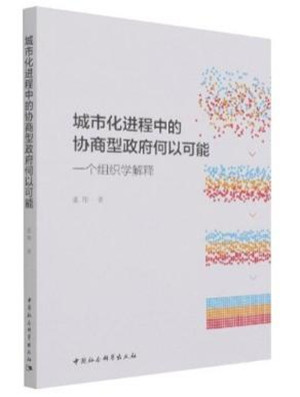
. > WHAT'S NEW > BOOKS
A transition of city governance amid urbanization
Author : WU XIAOLIN Source : Chinese Social Sciences Today 2023-04-13

Why a Consultative Government is Possible in the Process of Urbanization
Experiencing diverse and differentiated social population and interest structures, as well as resultant social problems and pressures, the concepts and methods of China’s urban governance are bound to be impacted, thus demanding more dynamic “urban logic” for modern governance systems. This not only requires city governments to adjust the government-society relationship conceptually, but also to innovate in governance technology.
Why a Consultative Government is Possible in the Process of Urbanization, by Zhang Xiang, a professor from the School of Public Administration at Fujian Normal University, keenly observes a trend in the transformation of urban governance—a shift from “a regulation-oriented government” to “a consultative government.” However, due to long-term institutional and organizational inertia, this process will long hover between change and unchange, spawning complex reform effects. Zhang attempts to unravel the process and answer a historical question concerning urban governance transformation—is a consultative government possible, and how can it be achieved?
Instead of simply discussing an idealistic institutional change, the book clearly realizes that the transformation of urban governance cannot deny and abandon the regulation orientation. Although it hinders the construction and development of a consultative government, the latter still needs the former to guarantee basic political and social order. The transformation of city governance needs to seek the institutional space and development direction of building a consultative government within a regulatory governance model. The author dares to jump out of the vacuum of subjective presupposition and practically face up to this “paradoxical” problem.
Through rich field investigation and careful case studies, the author points out the existence of an “administrative community” as an organizational form between the upper and lower levels of urban governments. Their special organizational mechanism of “top-down inclusion and bottom-up dependency” provides organizational protection for sustaining regulatory governments in cities, but rejects consultative governments to some extent. Even when driving the construction of consultative governance from the top down, it is still difficult for urban governments to institutionally complete the direct transformation of city governance modes.
However, an administrative community is not a closed organizational mechanism, seeing a metabolic “weak connection” relationship with social development. With growing needs for consultative governance within the entire society, it is able to accommodate the possibility of organizational innovation and reserve reform space for consultative governments. In the transformation of urban governance, it is difficult to further the construction of consultative governments through a general sense of institutional reform, but instead requires an institutional change path of organizational innovation, mechanism formation, and system confirmation.
Wu Xiaolin is a professor from the Zhou Enlai School of Government at Nankai University.
Ye Shengtao made Chinese fairy tales from a wilderness
Ye Shengtao (1894–1988) created the first collection of fairy tales in the history of Chinese children’s literature...
-
How northern ethnicities integrated into Chinese nation
2023-09-18
-
Mogao caves
2023-09-12
-
Mogao Grottoes as ‘a place of pilgrimage’
2023-09-12
-
Time-honored architectural traditions in China
2023-08-29
-
Disentangling the civilizational evolution of China
2023-08-28
-
AI ethics in science fiction
2023-08-23













 2011-2013 by www.cssn.cn. All Rights Reserved
2011-2013 by www.cssn.cn. All Rights Reserved